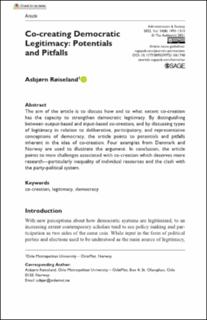| dc.contributor.author | Røiseland, Asbjørn | |
| dc.date.accessioned | 2023-02-21T08:40:33Z | |
| dc.date.available | 2023-02-21T08:40:33Z | |
| dc.date.created | 2023-01-05T14:08:15Z | |
| dc.date.issued | 2021-12-14 | |
| dc.identifier.issn | 0095-3997 | |
| dc.identifier.issn | 1552-3039 | |
| dc.identifier.uri | https://hdl.handle.net/11250/3052582 | |
| dc.description.abstract | The aim of the article is to discuss how and to what extent co-creation has the capacity to strengthen democratic legitimacy. By distinguishing between output-based and input-based co-creation, and by discussing types of legitimacy in relation to deliberative, participatory, and representative conceptions of democracy, the article points to potentials and pitfalls inherent in the idea of co-creation. Four examples from Denmark and Norway are used to illustrate the argument. In conclusion, the article points to main challenges associated with co-creation which deserves more research—particularly inequality of individual resources and the clash with the party-political system. | en_US |
| dc.language.iso | eng | en_US |
| dc.publisher | SAGE Publications | en_US |
| dc.relation.ispartofseries | Administration & Society;Volume 54, Issue 8 | |
| dc.rights | Navngivelse 4.0 Internasjonal | * |
| dc.rights.uri | http://creativecommons.org/licenses/by/4.0/deed.no | * |
| dc.title | Co-creating Democratic Legitimacy: Potentials and Pitfalls | en_US |
| dc.type | Peer reviewed | en_US |
| dc.type | Journal article | en_US |
| dc.description.version | publishedVersion | en_US |
| dc.rights.holder | © The Author(s) 2021 | en_US |
| cristin.ispublished | true | |
| cristin.fulltext | original | |
| cristin.qualitycode | 1 | |
| dc.identifier.doi | https://doi.org/10.1177/00953997211061740 | |
| dc.identifier.cristin | 2101389 | |
| dc.source.journal | Administration & Society | en_US |
| dc.source.volume | 54 | en_US |
| dc.source.issue | 8 | en_US |
| dc.source.pagenumber | 1493–1515 | en_US |
| dc.relation.project | Norges forskningsråd: 300761 | en_US |

